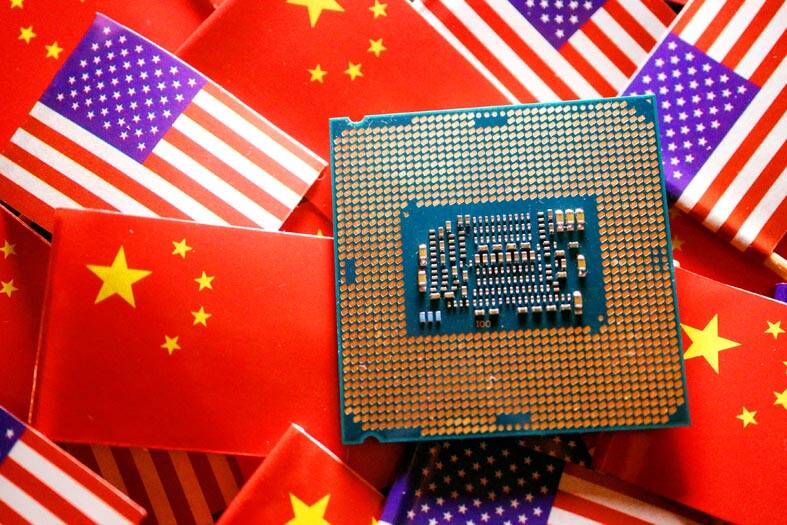China has introduced guidelines to phase out US microprocessors from Intel Corp and Advanced Micro Devices Inc (AMD) from government PCs and servers, the Financial Times reported yesterday.
The procurement guidance also seeks to sideline Microsoft Corp’s Windows operating system and foreign-made database software in favor of domestic options, the report said.
Chinese officials have begun following the guidelines, which were unveiled in December last year, the report said.

Photo: REUTERS
They order government agencies above the township level to include criteria requiring “safe and reliable” processors and operating systems when making purchases, the newspaper said.
The US has been aiming to boost domestic semiconductor output and reduce reliance on China and Taiwan with US President Joe Biden’s administration’s 2022 CHIPS and Science Act.
It is designed to bolster US semiconductors and contains financial aid for domestic production with subsidies for the production of advanced chips.
Separately, Apple Inc has discussed using Baidu Inc’s (百度) generative artificial intelligence (AI) in iPhones and other devices within China, the Wall Street Journal reported on Saturday, a potentially big win for the domestic search leader.
Apple has held initial talks about using Baidu’s generative AI technology in its gadgets, the Journal said, citing sources familiar with the matter. The US company sought a local partner because regulators there must vet all AI models, the newspaper added.
Baidu is considered one of the leaders in AI in China, where start-ups and tech giants are investing billions on developing their own answers to ChatGPT. OpenAI’s seminal creation and other foreign services are not available in China’s tightly regulated online sphere.
Apple has held discussions with Alphabet Inc’s Google and OpenAI about using their AI software on the iPhone. The company could tap multiple partners, as it does with search in its web browser.
Samsung Electronics Co, Apple’s top smartphone rival, uses Baidu as an AI provider in China for its latest Galaxy phones.
Meanwhile, South Korean chipmaker SK Hynix Inc CEO Kwak Noh-jung on Friday met with Chinese Minister of Commerce Wang Wentao (王文濤) to discuss cooperation.
Wang said he hopes SK Hynix would continue expanding investments in China as its market offers huge opportunities. Kwak said the company would keep pushing for greater development in China, which is one of its most important production bases and markets, in a statement shared yesterday.
SK Hynix is the world’s No. 2 memory chip maker after Samsung. Despite US-China technological tensions, Washington last year gave the two companies indefinite waivers to keep bringing some high-end equipment into China.
Wang also met with Apple Inc CEO Tim Cook, who unveiled plans to invest further in applied research in China. Apple gets almost 20 percent of its revenue from China and is SK Hynix’s largest customer, data compiled by Bloomberg showed.

TARIFFS: The global ‘panic atmosphere remains strong,’ and foreign investors have continued to sell their holdings since the start of the year, the Ministry of Finance said The government yesterday authorized the activation of its NT$500 billion (US$15.15 billion) National Stabilization Fund (NSF) to prop up the local stock market after two days of sharp falls in reaction to US President Donald Trump’s new import tariffs. The Ministry of Finance said in a statement after the market close that the steering committee of the fund had been given the go-ahead to intervene in the market to bolster Taiwanese shares in a time of crisis. The fund has been authorized to use its assets “to carry out market stabilization tasks as appropriate to maintain the stability of Taiwan’s

STEEP DECLINE: Yesterday’s drop was the third-steepest in its history, the steepest being Monday’s drop in the wake of the tariff announcement on Wednesday last week Taiwanese stocks continued their heavy sell-off yesterday, as concerns over US tariffs and unwinding of leveraged bets weighed on the market. The benchmark TAIEX plunged 1,068.19 points, or 5.79 percent, to 17,391.76, notching the biggest drop among Asian peers as it hit a 15-month low. The decline came even after the government on late Tuesday authorized the NT$500 billion (US$15.2 billion) National Stabilization Fund (國安基金) to step in to buoy the market amid investors’ worries over tariffs imposed by US President Donald Trump. Yesterday’s decline was the third-steepest in its history, trailing only the declines of 2,065.87 points on Monday and

TARIFF CONCERNS: The chipmaker cited global uncertainty from US tariffs and a weakening economic outlook, but said its Singapore expansion remains on track Vanguard International Semiconductor Corp (世界先進), a foundry service provider specializing in producing power management and display driver chips, yesterday withdrew its full-year revenue projection of moderate growth for this year, as escalating US tariff tensions raised uncertainty and concern about a potential economic recession. The Hsinchu-based chipmaker in February said revenues this year would grow mildly from last year based on improving supply chain inventory levels and market demand. At the time, it also anticipated gradual quarter revenue growth. However, the US’ sweeping tariff policy has upended the industry’s supply chains and weakened economic prospects for the world economy, it said. “Now

An employment discrimination lawsuit against contract chipmaker Taiwan Semiconductor Manufacturing Co (TSMC, 台積電) might soon be expanded after a hearing in a federal court in San Jose, California, on Tuesday to add 15 plaintiffs to the case. According to a court document, the lawsuit, which was refiled in November last year as a form of a class action with 13 plaintiffs in California, wants to add 15 plaintiffs from Arizona, where TSMC is building up its wafer fab capacity. TSMC first committed between 2020 and last year to invest US$65 billion in three advanced wafer fabs in Arizona. It then pledged an